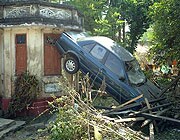
TUESDAY, April 19 (HealthDay News) — Swedish tourists who saw the most severe trauma in the wake of the 2004 Indian Ocean tsunami have taken longer than their peers to recover psychologically, a new study has found.
“Exposure was associated with increased levels of post-traumatic stress reactions, even three years after the disaster,” researchers report in a study led by Kerstin Bergh Johannesson of Uppsala University Hospital. Those who lost a loved one were especially affected.
The researchers tracked almost 3,500 Swedish survivors of the tsunami, which killed nearly 230,000 people in 14 countries. Most of those monitored by the study were on vacation in Southeast Asia when the tsunami hit.
About 98 percent of those with low levels of exposure to trauma had a “resilient” response, but only 77 percent of those with high levels of exposure did, the study reported. Among those who lost a loved one, only about half had a “resilient” response. The findings are reported in the Journal of Nervous and Mental Disease.
Three years after the tsunami, researchers found mental health issues in 28 percent of those who’d had high levels of exposure, 20 percent of those with medium levels and 43 percent of those who had lost a loved one.
Women, younger people, those with lower education and people with previous mental illnesses were more likely to have taken longer to recover.
“This study highlights the long-term negative effects of severe exposure and traumatic loss, which appear to slow down recovery,” the researchers wrote. “Identification of symptoms and subsequent support or trauma-focused psychotherapy might facilitate optimal recovery.”
More information
The U.S. National Institute of Mental Health has more on post-traumatic stress disorder.

